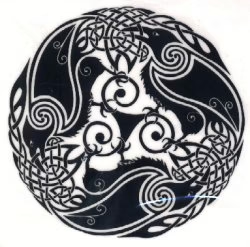In this post…
The tension between free will and determinism has perplexed humanity for centuries. Norse mythology offers a fascinating perspective through the concept of fate as woven by the Norns—three powerful beings who determine the destiny of all living things. This framework provides a way to harmonize the seemingly contradictory ideas of preordained fate and individual agency.
The Norns: Weavers of Fate

In Norse mythology, the Norns are three mystical figures: Urd (Past), Verdandi (Present), and Skuld (Future). They dwell at the base of Yggdrasil, the World Tree, and weave the threads of destiny into an intricate web. This web represents the interconnectedness of all events and outcomes. Their weaving symbolizes determinism, as every strand contributes to the greater tapestry of existence.
However, the Norns’ work does not imply rigid fatalism. While they shape the broad strokes of destiny, they leave room for individual actions to influence the finer details. This dynamic interplay between fixed patterns and personal choices aligns closely with the philosophical debate about free will and determinism.
Determinism in Norse Fate: The Tapestry of Life
The Norns’ weaving suggests that life’s overarching framework is predetermined. Each person’s thread is connected to others, creating a complex network, or a net if you prefer, of cause and effect. This deterministic view acknowledges that our lives are influenced by forces beyond our control, such as ancestry, societal structures, and cosmic events.
For example, a warrior’s destiny may be to fight in a great battle, as foretold by the Norns. This outcome reflects the deterministic aspect of fate. However, the path the warrior takes to reach the battlefield and the choices they make along the way remain open to free will.
Free Will in Norse Fate: Choosing Within the Web
While the Norns weave the tapestry, individuals have the power to navigate its threads. Norse mythology emphasizes the importance of personal honor, courage, and decision-making. These qualities demonstrate that free will plays a vital role in shaping one’s life within the boundaries of fate.
Consider the story of Sigurd, the dragon slayer. Although his destiny was foretold, his choices—to seek treasure, to trust others, and to embrace his heroic journey—defined his legacy. This interplay between destiny and choice illustrates how free will allows individuals to influence their fate while operating within a preordained structure.
Integrating Free Will and Determinism Through Norse Fate
The Norse concept of fate reconciles free will and determinism by presenting them as complementary forces. Determinism provides the framework, while free will offers the agency to navigate it. This dual perspective allows individuals to accept life’s uncertainties while embracing their ability to shape their paths.
For instance, the Norns may weave a thread that suggests a challenging life for an individual. However, through resilience, creativity, and conscious choices, that person can transform challenges into opportunities for growth. This integration empowers individuals to engage with their destiny actively rather than passively accepting it.
Practical Applications of Norse Fate
Understanding the Norse concept of fate can offer valuable insights into modern life. Here are some practical ways to apply this wisdom:
- Acceptance and Agency: Recognize the aspects of life that are beyond your control while focusing on the choices you can make. This balance nurtures resilience and empowerment.
- Mindful Decision-Making: Approach decisions with an awareness of their potential ripple effects within the larger web of existence. This perspective encourages thoughtful and intentional actions.
- Embracing Challenges: View difficulties as threads in your own tapestry, contributing to the richness of your life’s story. This mindset can transform obstacles into opportunities for growth.
- Connecting with Nature: Engage with natural symbols like trees and water, which are central to Norse mythology. These elements can inspire reflection on the interconnectedness of life.
A Unified Perspective
The Norse concept of fate, as shaped by the Norns, provides a viable way to reconcile free will and determinism. By understanding life as a tapestry woven with both fixed patterns and individual choices, we can approach existence with a sense of purpose and agency. This perspective encourages us to honor the past, embrace the present, and shape the future, all while recognizing our place within the intricate web of life.
Share Your Thoughts on the Norns and Free Will!
Do you think that the Norns rule our fate, or is there some room for free will? Share your thoughts in the comments below!
Don’t forget to check out my YouTube Channel for more!
